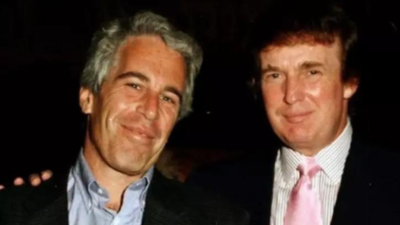A new chapter in the Jeffrey Epstein saga is unfolding in Washington, and once again, Donald Trump is at the centre of the storm. House Democrats this week released a page from Epstein’s 2003 birthday book that appears to contain a doodle and the signature “Donald.” The former president has denounced the entry as a fabrication and launched a $20 billion defamation suit against the Wall Street Journal, but forensic comparisons and linguistic analysis suggest the handwriting bears striking resemblances to Trump’s own past work.The release of the birthday book has reignited questions about the former president’s proximity to Epstein, the disgraced financier who died in prison in 2019 while awaiting trial for sex trafficking. For Trump’s opponents, the note is evidence of a personal connection that belies his public attempts to distance himself from Epstein. For his supporters, it is yet another politically motivated smear designed to damage a president they believe is perpetually under siege.
A disputed signature
At the heart of the dispute is the single word “Donald,” scrawled in a jagged style at the bottom of a typewritten note. Unlike Trump’s famously vertical and sharp full-name signature used on official documents, this version is looser, abbreviated, and resembles some of the informal autographs he used in personal letters during the 1990s and 2000s. The page also contains a marker drawing that critics describe as crude and lewd — arcs suggesting a woman’s breasts alongside rough sketch lines. Over the years, Trump has been known to doodle during meetings, and some of his drawings, including cityscapes and architectural sketches, have been auctioned for charity. Analysts say the strokes on the Epstein page show similarities with those doodles.

.
Beyond the visuals, the language of the note has raised eyebrows. Phrases such as “Enigmas never age” and “a pal is a wonderful thing” echo Trump’s long-standing verbal tics. He has repeatedly used the word “enigma” in his books to describe figures ranging from boxing promoter Don King to broadcaster Dan Rather. Similarly, his campaign speeches and interviews are peppered with the phrase “a wonderful thing,” a stock expression that appears in the Epstein note.
Trump’s denial and lawsuit
Trump has responded with characteristic aggression. He has flatly denied writing the note or creating the doodle, calling it “a fake thing” designed to discredit him. His lawsuit against the Wall Street Journal, filed shortly after the newspaper’s initial report in July, seeks damages of at least $20 billion. The legal complaint accuses the Journal of defamation, reckless reporting, and collusion with political opponents.White House press secretary Karoline Leavitt reinforced the president’s line, insisting on social media that it was “very clear President Trump did not draw this picture, and he did not sign it.” Administration officials argue that the autograph in the birthday book does not resemble Trump’s current signature style, which has become more rigid and formal over the years.Yet critics point out that handwriting naturally evolves. Analysts who have reviewed the document note that the casual “Donald” signature fits within the broader arc of Trump’s penmanship during the late 20th and early 21st centuries.
MAGA rallies behind forgery claims
If Trump’s critics saw the release as explosive, his supporters treated it as little more than political theatre. MAGA influencers and conservative commentators quickly lined up to dismiss the page as an amateur forgery.Charlie Kirk, founder of Turning Point USA, declared bluntly that the signature looked “fake.” Podcaster Benny Johnson quipped that Trump’s autograph was “the most famous in the world” and impossible to replicate convincingly, suggesting the release was so sloppy it should trigger lawsuits “into oblivion.”Inside the administration, Deputy Chief of Staff Taylor Budowich echoed the arguments, claiming vindication because the signature did not match Trump’s more recent autographs. Vice President JD Vance went further, accusing Democrats of hypocrisy. “The Democrats don’t care about Epstein. They don’t even care about his victims,” he wrote on social media, framing the release as another “fake scandal like Russiagate” aimed at undermining Trump.Breitbart’s Washington bureau chief Matthew Boyle hailed the release as proof that “critics of Trump over Epstein have been totally and completely full of it for the past three months.” His comments reflected a broader sentiment within the movement: after years of speculating about Epstein’s “client list” and possible establishment cover-ups, MAGA has closed ranks behind Trump, even at the cost of abandoning demands for transparency that once animated the base.
How the book surfaced
The birthday book, created in 2003 to mark Epstein’s 50th birthday, contained notes, letters, and drawings contributed by acquaintances. It was turned over by Epstein’s estate to the House Oversight Committee in response to a subpoena. Democratic lawmakers Robert Garcia and Ro Khanna had pressed for its release, arguing that the material was relevant to understanding Epstein’s network of relationships.The page attributed to Trump contains both a typewritten note and the handwritten additions. The note is written in the third person, a stylistic choice Trump has often employed in speeches and social media posts. Analysts argue that the combination of signature style, doodling habits, and word choices makes the attribution credible.
Why it matters
The controversy underscores two enduring dynamics in American politics. First, Epstein’s legacy continues to haunt the powerful. More than six years after his death, his documents, calendars, and correspondence still threaten to implicate public figures across the political spectrum. Every new release is treated as a potential bombshell, though the political impact depends largely on who is named.Second, the Trump movement’s relationship to the Epstein story has shifted dramatically. Earlier this year, MAGA supporters were outraged when the Justice Department reaffirmed that Epstein died by suicide and insisted no “client list” existed. At that time, the base demanded answers and even questioned whether Attorney General Pam Bondi should be removed for not pressing harder.But once Trump himself became linked to the birthday book, the grassroots fury evaporated. Instead of insisting on transparency, the movement now treats the entire episode as a partisan fabrication. The transformation reflects the degree to which Trump personally defines the MAGA universe: when he is under attack, narratives bend to protect him.
Democrats vs Republicans
For Democrats, the release is ammunition in their long-running critique of Trump’s character and associations. By making the Epstein page public, they aim to highlight what they see as the former president’s proximity to one of America’s most notorious predators. The move also shifts the political conversation back to questions of integrity at a time when Trump is pursuing aggressive policy changes in office.Republicans, by contrast, have portrayed the release as an act of desperation. With Trump back in the White House, they argue, Democrats are reaching for recycled scandals to damage his presidency. The forgery claims provide a simple narrative for the base: the opposition cannot beat Trump on policy, so they are resorting to manufactured controversies.
The road ahead
The authenticity of the birthday book page is unlikely to be resolved quickly. Trump’s lawsuit against the Wall Street Journal could drag on for years, and expert testimony on handwriting and authorship will be contested. In the court of public opinion, the verdict may already be set: supporters will continue to dismiss it as fake, opponents will insist it fits a pattern, and swing voters may simply tune out.What is clear is that the Epstein scandal, once thought to have faded with the financier’s death, continues to echo across American politics. Each new document release revives speculation, fuels partisan arguments, and forces uncomfortable questions about who knew Epstein and in what capacity. For Trump, the birthday book has become less about Epstein and more about the durability of his political brand — a test of whether any revelation can shake the loyalty of his movement. Go to Source




